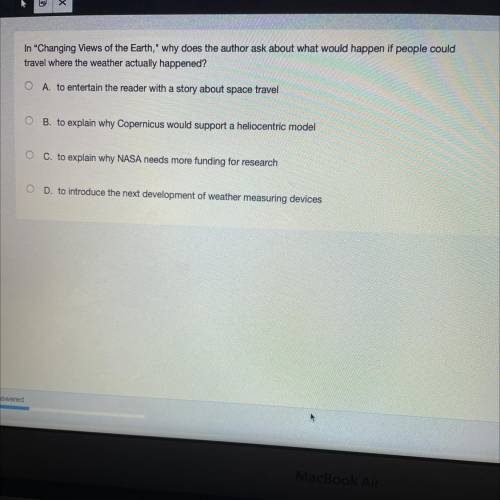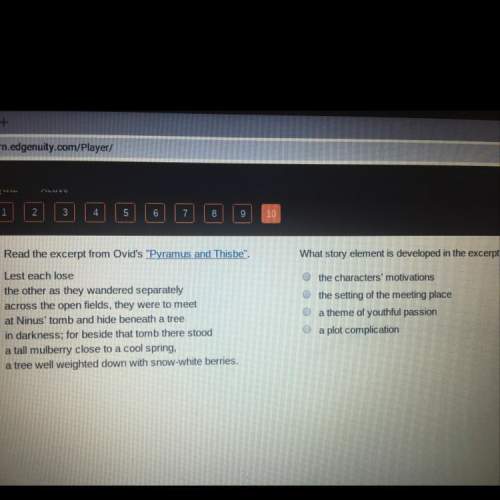
English, 18.03.2021 01:10 miyapooh3472
In "Changing views of the Earth," why does the author ask about what would happen if people could
travel where the weather actually happened?
O A. to entertain the reader with a story about space travel
O B. to explain why Copernicus would support a heliocentric model
O C. to explain why NASA needs more funding for research
OD. to introduce the next development of weather measuring devices


Answers: 3
Another question on English

English, 21.06.2019 21:10
Read the passage below and answer the question. marcus had a reputation for being craven. no one had ever seen him do a single brave thing. using context clues, how would you define the word craven in the passage? intense courageous cowardly thoughtful
Answers: 1


English, 22.06.2019 04:50
Read the passage, then answer the question that follows. no one could have seen it at the time, but the invention of beet sugar was not just a challenge to cane. it was a hint—just a glimpse, like a twist that comes about two thirds of the way through a movie—that the end of the age of sugar was in sight. for beet sugar showed that in order to create that perfect sweetness you did not need slaves, you did not need plantations, in fact you did not even need cane. beet sugar was a foreshadowing of what we have today: the age of science, in which sweetness is a product of chemistry, not whips. in 1854 only 11 percent of world sugar production came from beets. by 1899 the percentage had risen to about 65 percent. and beet sugar was just the first challenge to cane. by 1879 chemists discovered saccharine—a laboratory-created substance that is several hundred times sweeter than natural sugar. today the sweeteners used in the foods you eat may come from corn (high-fructose corn syrup), from fruit (fructose), or directly from the lab (for example, aspartame, invented in 1965, or sucralose—splenda—created in 1976). brazil is the land that imported more africans than any other to work on sugar plantations, and in brazil the soil is still perfect for sugar. cane grows in brazil today, but not always for sugar. instead, cane is often used to create ethanol, much as corn farmers in america now convert their harvest into fuel. –sugar changed the world, marc aronson and marina budhos how does this passage support the claim that sugar was tied to the struggle for freedom? it shows that the invention of beet sugar created competition for cane sugar. it shows that technology had a role in changing how we sweeten our foods. it shows that the beet sugar trade provided jobs for formerly enslaved workers. it shows that sweeteners did not need to be the product of sugar plantations and slavery.
Answers: 1

English, 22.06.2019 09:50
The speaker's tone in "harlem" is best described as frustrated conflicted. joyful. accepting
Answers: 2
You know the right answer?
In "Changing views of the Earth," why does the author ask about what would happen if people could
t...
Questions


Mathematics, 13.11.2020 21:30

Mathematics, 13.11.2020 21:30




Biology, 13.11.2020 21:30

Mathematics, 13.11.2020 21:30




Mathematics, 13.11.2020 21:30






English, 13.11.2020 21:30

Mathematics, 13.11.2020 21:30




